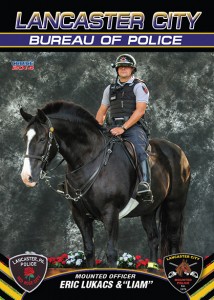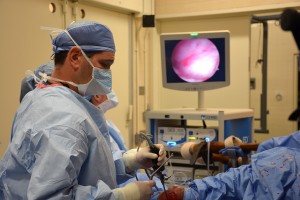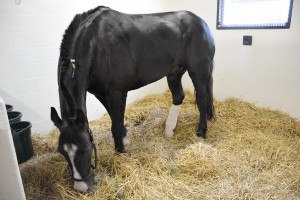Lameness 911
Penn Vet Extra by: Louisa Shepard
(provided with permission)
This officer in the Lancaster City police department did not take a sick day in more than 10 years, working the street beat answering 911 calls year-round. But he had to be taken off duty in July, when he came up lame.
Liam, a 13-year-old Draft horse cross, is one of four horses in the Lancaster City Mounted Police Unit. He did not respond to immediate treatment prescribed by his local veterinarian, so he was referred to Penn Vet’s New Bolton Center.
“Liam was limping really badly,” said Officer Eric Lukacs, Liam’s rider and caregiver. “We have had great success with New Bolton Center, so there was no question we would bring him there.”
Upon arrival, Liam was unable to bear weight on his right hind leg. Dr. Elizabeth Davidson, Associate Professor of Sports Medicine, evaluated the lameness through radiographs, ultrasounds, and by watching him walk and jog in-hand.
“We diagnosed a problem with his tendon sheath,” Dr. Davidson said. “This is a serious injury that required surgery for treatment.”
The condition is known as tenosynovitis: a chronic, inflamed, fluid-filled tendon sheath, said Dr. David Levine, Staff Surgeon. Liam had several tears in the tendon around his right hind fetlock, the joint just above the hoof. The tendon was stuck to the sheath in several places, known as adhesions, making it painful and difficult to move.
Dr. Levine performed minimally invasive surgery known as tenoscopy. During the procedure he debrided, or broke down and removed, the adhesions in the tendon sheath to allow normal function. He also cut the annular ligament, the band of tissue that constricts the area.
“Cutting that ligament allows the tendon to expand and lets it glide more freely, which takes away a lot of the pain,” Dr. Levine explained, adding that the annular ligament will heal in time.
The surgery was successful. “Liam woke up and was immediately more comfortable,” Dr. Levine said. “When he arrived he was toe-touching, barely able to walk, and after surgery he was able to trot.”
With any long recovery from a serious injury, there can be setbacks. Liam returned to New Bolton Center on Monday, September 8, with a leg infection.
The Sports Medicine team performed an ultrasound, and Dr. Levine performed another surgery, to flush the sheath and close a surgical incision. Liam received daily regional limb perfusions, in which high levels of antibiotics were delivered directly to the affected leg. Liam also was put on oral antibiotics.
Liam went home on September 10, and returned for a re-examination on Tuesday, September 16. “The leg looks excellent. The swelling has decreased and there are no signs of infection,” Dr. Levine said. “Liam is walking more comfortably.”
Dr. Levine said Liam’s recovery is back on track.
“We feel comfortable being at New Bolton. It’s the place to get answers. And it is the best option anywhere,” Officer Lukacs said before getting in the truck to drive Liam home. “We know they are going to do everything they can to help him. We’re just going to take the time we need to get him better.”
Dr. Davidson prescribed a rehabilitation course of hand-walking, increasing the amount as the leg gains strength. Recovery could take six months to a year.
Officer Lukacs is Liam’s primary caregiver and takes the big black horse on his daily walks. He shares these duties with long-time caregiver Dawn Sanders, who works with Deb Berkoski to care for the horses and maintain the 80-acre park where they live.
No one knows what specifically caused Liam’s injury. But Lukacs said the officers used to joke that Liam “stood like a cow,” a little off-kilter. One theory is that Liam had a slight tendon injury in the past that healed on its own, creating scar tissue that led to the adhesions and the current condition.
“He stands up like a regular horse now,” Lukacs said.
The police unit follows a “one horse/one rider” approach, so only Officer Lukacs has ridden Liam during the past eight years. Their primary beat is the business district of downtown Lancaster. “We are out every day. We answer 911 calls just like a car, but I tie him up,” Lukacs said.
The pair is easily recognized in town. Liam’s injury and recovery have been followed by thousands on the Lancaster City Police Mounted Unit Facebook page. A local Irish pub, Tellus360, is holding a fundraiser for the unit in honor of Liam’s Irish name.
The mounted unit in Lancaster was founded in 1979. The care and expenses for the four horses, and the K-9 unit’s two dogs, are covered by the Lancaster City Mounted Police Foundation.
Lancaster City is one of only four mounted police units in Pennsylvania, along with Philadelphia, Bethlehem, and the state police. The units partner for crowd control at large events, such as concerts and sporting events, even the G-20 international economic summit in Pittsburgh.
The police department bought Liam, a Clydesdale-Hackney cross, 10 years ago when he was a three-year-old working as a cart horse in Canada. Since he was used to traffic and roadways, he was a great candidate for a police horse, which requires extensive training.
Officer Lukacs and Liam“He’s very tolerant and tough, but he’s also easy going,” said Lukacs.
“I am so in tune with him. With Liam I can anticipate everything. I know his likes and his dislikes.”
Lukacs, 37, has been on the Lancaster police force for 12 years, and with Liam since he joined the mounted unit eight years ago. “We bond with these horses,” he said. “We groom them. We feed them. We take care of them.”
Liam is expected to return to New Bolton Center periodically for lameness and ultrasound examinations. “We will be looking at the quality of the healing,” Dr. Davidson said.
New Bolton Center treats police horses on occasion. Another Lancaster City horse, a white Percheron named Duke, was saved by emergency colic surgery at New Bolton Center a few years ago.
Duke will be Lukacs mount until Liam recovers. “Liam’s very upbeat,” Lukacs said. “There’s a day or two a little slower than others, but he has a great attitude.”













